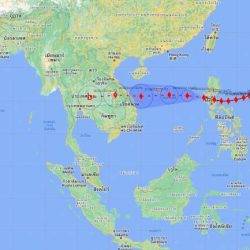Lure of high yields, lax regulators behind Ponzi scams

More than 13,000 victims are estimated to have suffered losses of several billion baht as a result of the latest alleged Ponzi scheme, under the name Forex 3D, supposedly engaged in forex trading.
The alleged Ponzi scheme is currently under police investigation and some of the suspected masterminds are in custody, including some celebrities from the entertainment industry.
Why do so many people fall prey to such Ponzi schemes without learning the lessons from previous cases?
One hypothesis is that people search for higher yields due to low bank deposit rates and low return on investment from the domestic stock market. Many people are unable to make ends meet, so they become vulnerable to financial cheating through pyramid schemes.
Thailand has experienced a long period of slower economic growth since the country experienced a financial crisis in 1997. The crisis has been followed by low investment, low economic growth, an aging society and political instability. Given such bleak economic conditions, many people are seeking high returns on their savings and taking excessive risks.
Exploding social media
The advent of social media platforms has led to a surfeit of information.
“People have access to much more information but they do not have adequate financial literacy to make proper sense of the information,” said Soraphol Tulayasathien, senior executive vice president at the Stock Exchange of Thailand (SET). He said the SET has for long urged people to acquire financial literacy.
Those who come up with Ponzi schemes try to cash in on the explosion in social media platforms. Financial cheats often project their profile of being a successful person, owning a luxury car, using elite brand products, living in an opulent home and claiming to be connected to influential people.
Taking advantage
The social media explosion is accompanied by ease of trading in digital assets and forex. Digital asset exchange platforms make it easier to trade those assets domestically or even globally.
Stocks and forex trading is popular among new, inexperienced traders. In Thailand, digital asset platforms are licensed by the Securities and Exchange Commission (SEC). Many people with access to the internet and social media have been able to engage in forex trading in Thailand even though it has not been licensed by the Finance Ministry.
“Ponzi masterminds use trending assets, such as stocks and cryptocurrencies, as bait to lure people into their dubious schemes,” said Chanisara Dumkum, researcher at Thailand Development Research Institute, which is a part of a team studying Ponzi crimes in Thailand.
Ponzi modus operandi
Fraudsters often lure people into investing in some assets, such as gold, digital assets, and forex by promising high returns — for example, 10 or 20 percent per month — compared with what is available in the market.
Initially, those who make their first investment get the promised returns, which convinces them about a continuous stream of high returns in the future. They are tempted to put more money into the scheme. They are also promised rewards if they could introduce more people to the scheme.
The Ponzi operators now channel the new investment to reward old investors, and the cycle continues until they reach a point where they are unable to recruit more people into the scheme, precipitating the collapse of the Ponzi. Once the warning signs become clear, the people behind the scheme usually take their money and run.
Weak law enforcement
Chanisara blamed the light punishment meted out to the cheats as failing to act as a deterrence. She cited the example of a high-profile Ponzi operator “Mae-chamoy”, who served only seven years and 11 months in jail even though a large number of people were victims of her pyramid scheme and suffered combined financial losses of over 4 billion baht.
“The punishment is not proportionate to the seriousness of the economic crimes committed by wrongdoers, which resulted in huge financial damage to a large number of people,” Chanisara said.
Several regulators, ranging from the Office of the Consumer Protection Board, the SEC, the Finance Ministry’s Fiscal Policy Office, Bank of Thailand, Anti-Money Laundering Office (AMLO), and Royal Thai Police’s special investigation department, have a duty to help people on the issue.
The Thai police and AMLO have the authority to investigate economic crimes under the emergency decree on borrowings which are regarded as public cheating and fraud B.E. 2527 (1984) and Anti-Money Laundering Act B.E. 2542.
Victims are often confused on who they should turn to for help. Bureaucratic procedures often slow down the investigation, giving the wrongdoers an escape hatch to flee and hide their assets, said Chanisara.
She proposed that the regulators jointly set up a central agency that could deal directly with Ponzi schemes.
She also blamed regulators for adopting a defensive approach in discharging their duties and for waiting to be informed by victims. She suggested that AMLO play a more vigilant role in scrutinizing financial transactions reported to them under the law. The SEC should actively monitor social media platforms as these days, a large number of groups set up on Facebook or Line chat lure people into financial scams, she said.
Falling for the bait
Some people know what they are getting into when they are introduced to a Ponzi scheme. But these victims delude themselves into thinking that they could outsmart the Ponzi operators by exiting quickly with handsome profits and making a quick gain from their investment.
These groups usually have high income and knowledge, but they want to indulge in short-term speculation, Chanisara added.
By Thai PBS World’s Business Desk






